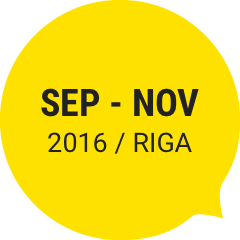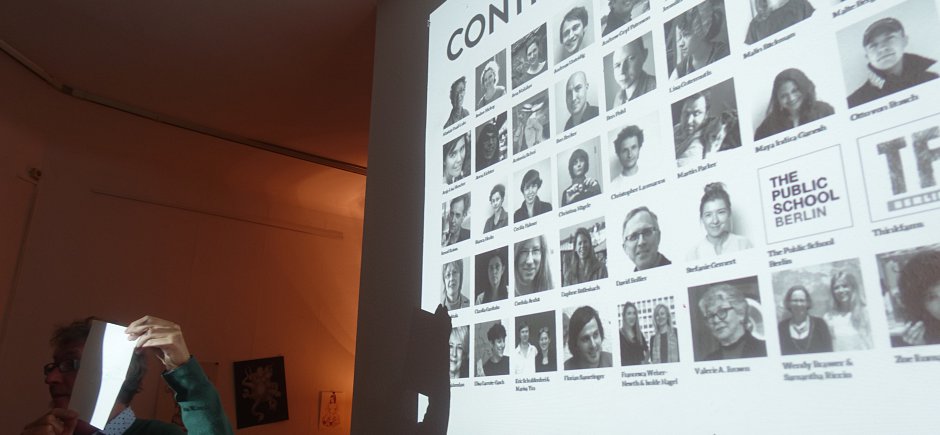
Programme
Imagine 2020
12 November 17.00-21.50, Kaņepes Kultūras centrs | Free entrance
We have arrived at a critical point, where it is becoming more and more difficult to pretend that depletion of natural resources, climate change, local and global inequalities, radicalisation of opinions and the consequences of all these processes have nothing to do with us. The question is no longer whether there has to be change and whether there will be change. The question is how it will happen. This time instead of talking about the world we currently live in we will attempt to talk about the world we want to live in the future and how we could get there.
Programme curated by transnational activist organisation Agents of Alternatives
17.00-18.00
Katharina Moebus
Talk: Agents of Alternatives – Re-designing Our Realities
Agents of Alternatives – Re-designing Our Realities’ (2015) is a collectively written book exploring the visions, actions, tools and impacts of ‘alternativ-ists’ who are applying creative practices to forge plausible, alternative ways of working and living. It presents an integrated framework for navigating a collection of essays, interviews and case studies from well-known international contributors and local activists. These originate from diverse fields, including design, the arts, architecture, education, politics, economics, urban planning and city administration, social enterprises, non-governmental organisations, and experts on the Commons. Katharina Moebus, co-editor of the book will explore the context and ideas presented in the book and open a space for a conversation and dialogue with the audience.
18.00-19.00
Alekos Pantazis
Lecture: Hacking the “Musical Chairs” game: The Commons
In order to depict Commons in a nutshell, we could use the comparison of Jose Ramos and say that a “Commons” musical chairs game would be the reverse of the classical “Capitalistic” and current musical chairs game – it adds new chairs to the game instead of removing them. When the music stops, a chair is added and another person can join the game. In the current game, each year has less environmental “chairs” and less humane “chairs”. Commoning is a vibrant activity for the deployment of a new type of game that will treat “chairs” as a common good. That is because we take pleasure from Commoning and think that humanity is tired of standing in the middle of eternity with so many unused and destroyed chairs around her. As Buckminster Fuller used to say: “You never change things by fighting the existing reality. To change something, build a new model that makes the existing model obsolete” and this is what Commoning is all about.
19.00-20.00
Frauke Hehl
Lecture: How to have fun being an ‘agent of alternatives’ within the ‘wrong’ world around
Frauke Hehl will talk about projects like the workstation Ideenwerkstatt Berlin e.V. which are focused on carrying out all daily life solutions to people, to empower people in figuring out their identities and the different forms of working and living, exploring the question of what a future-compliant lifestyle, often selfmade and unconventional, could look like. She will also give more insight into how always next to the aim to challenge social, political and societal changes, there is also the aim to give people a platform to reorganise their individual and common lifestyles on a pragmatic scale to sustainable and satisfying ones.
20.00-21.50
Envisioning New Futures: World Café facilitated by Katharina Moebus & Alekos Pantazis
The World Café is a structured conversational process intended to facilitate open and intimate discussion, and link ideas within a larger group to access the collective intelligence or collective wisdom in the room. Participants move between a series of tables where they continue the discussion in response to a set of questions, which are predetermined and focused on the specific goals of each World Café, in this case exploring the question of alternative futures. The first World Café event was organised in 1995 and since then the number of people who have participated in events is estimated to be in the tens of thousands.
About Agents of Alternatives
Agents of Alternatives is a transnational non-profit organisation whose mission is to promote and support positive societal change amongst citizen, neighbourhoods and communities. Through their work, Agents of Alternatives aim to connect people with grassroots initiatives while also connecting different initiatives amongst each other and support collaboration between citizen activists, policy makers and other actors.
In 2015 the collective released the book Agents of Alternatives – Re-designing Our Realities that explores the visions, actions, tools and impacts of ‘alternativ-ists’ who are applying creative practices to forge plausible, alternative ways of working and living. It presents an integrated framework for navigating a collection of essays, interviews and case studies from well-known international contributors and local activists. These originate from diverse fields, including design, the arts, architecture, education, politics, economics, urban planning and city administration, social enterprises, non-governmental organisations, and experts on the Commons.
Speakers
Katharina Moebus is an interdisciplinary designer working at the crossroads of design, art, activism, research, and education. Her research focuses on active citizenship, working with neighbourhoods, emerging practices of commoning, peer-to-peer learning and degrowth. She is co-founder of Agents of Alternatives, co-editor of the same-named book, and just about to take up her PhD studies at Sheffield University School of Architecture. After some ten years of living and working abroad between Italy, Switzerland, Austria, Laos and Finland, she is now based in Berlin.
Alexandros (Alekos) Pantazis is Research Fellow at the P2P Lab, an interdisciplinary research hub, community-driven makers space, and spin-off of the Ragnar Nurkse School and the P2P Foundation. He is an environmental engineer, with expertise in participatory design for nature conservation and integrated coastal zone management. Alekos has 15 years experience of active involvement in civil movements in various rural regions of Greece and abroad, focusing on agrarian grassroots movements as well as on degrowth and commons movements. He has strong background in non-formal education and has been involved as a scientific assistant/coordinator in a number of European projects in the areas of marine conservation and community-based management as well as in the area of digital commons.
Frauke Hehl is CEO of Kunst-Stoffe, Zentralstelle für wiederverwendbare Materialien e.V. in Berlin. Herein she is the coordinator of WIR – Wiederverwenden, Instandhalten und Reparieren in der Berufsausbildung and reusecity – urban recycling network. She is co-founder of www.kunst-stoffe-berlin.de as well as of many other community projects, labs as www.workstation-berlin.org, www.allmende-kontor.de, www.rosarose-garten.net, which target to empower people, to give platforms for participation and sustainable city development. She also works as an instructor for adults education.
12
November
17.00-21.50
Free entrance


